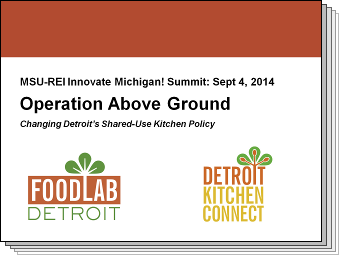Discovering and applying new and innovative economic development tools, models, policies, and programs
Creating Jobs and Wealth in Distressed Michigan Communities
2014: Operation Above Ground: Improving Licensing for New Food Businesses to Promote a stronger Detroit Food Economy
Co-Learning Plan - 2014
Author(s): Jess Daniel, FoodLab Detroit
Summary
This Co-Learning Plan provided research and a visual mapping of the current licensing process for five new and alternative models of food business to take the first step in removing a significant barrier to the emergence of a more diverse, thriving, healthy, and innovative food economy in Detroit.
Project Updated As Of September 30th, 2014
Webinars
Author Information
 Jess Daniel, FoodLab Detroit
Jess Daniel, FoodLab Detroit
Jess Daniel is Director and Chief Enabler at FoodLab Detroit, a growing community of food businesses that work together within a broader movement to make healthy, fair, ecologically sound food a reality for all Detroiters. She is obsessed with the ways that good facilitation and other organizing structures can help us move toward a more just, loving, creative, and resilient world. She recently put her doctoral work on hold, but she hopes to return to the Community Sustainability department at Michigan State University to complete her action research dissertation related to FoodLab's mission.
Detailed Description
"Operation Above Ground" was a 2014 Co-Learning plan authored by former Foodlab Detroit Executive Director, Jess Daniel and researcher, Rebecca Baylor. This project intended to promote the emergence of a more diverse and productive food economy in the motor city. The team researched the food licensing process and addressed possible barriers to entry. Using this information, the project team stated three specific goals that would give local entrepreneurs in the food industry a better blueprint for success.
The first task was to offer assistance to Detroit's small food business owners who were not yet properly licensed, next, the team developed a "map" of the current licensing process for the top five alternative food business models with the help of local regulatory agencies. These alternative models include temporary-to-permanent pop-ups and shared-use kitchens. The third goal was to make progress toward a fairer fee structure for these co-ops and shared-use kitchens.
Since the initial "Operation Above Ground" publication, FoodLab Detroit has worked with MDARD inspectors to create a licensing guide. In addition, FoodLab Detroit is now working to more fully understand the regulatory environment in order to create easy-to-understand resources (in both English and Spanish) for entrepreneurs. Currently there are 192 Foodlab member businesses benefitting from partnership. Foodlab continues to hold frequent Licensing & Regulations 101 workshops for entrepreneurs who wish to learn more about producing safe food products to sell in the marketplace. In July of 2015, Foodlab Detroit received $100,000 from the W.K. Kellogg Foundation to help them support more small businesses and continue to improve their platform.
View the Report


